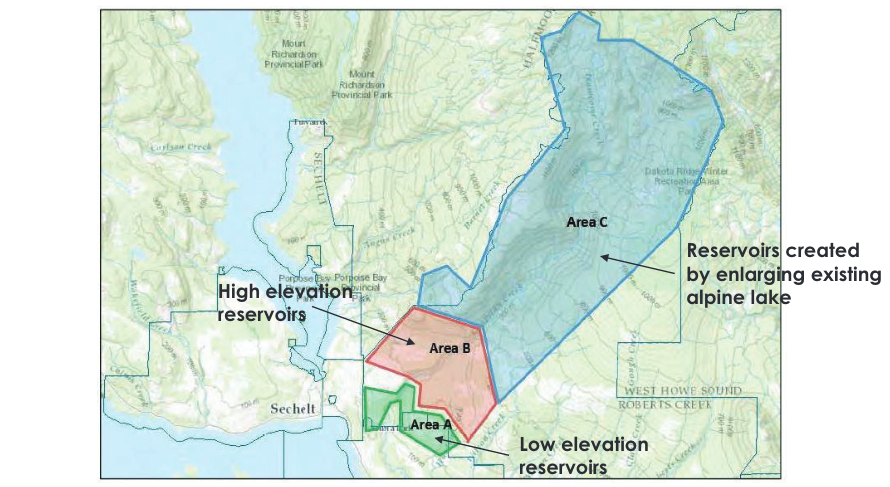The Sunshine Coast Regional District’s (SCRD) infrastructure committee has recommended spending a further $350,000 on reservoir feasibility studies.
The committee heard from Integrated Sustainability Consultants at the Feb. 21 meeting that after the first two phases of the study they narrowed down the possible reservoir sites to four – two locations where open, engineered lake designs would work and two alpine lakes high in the Chapman watershed that could be dammed.
The potential engineered lake sites, known as A and B, are east of the Lehigh gravel operation and not far from the SCRD’s existing treatment plant for the Chapman system.
The alpine lakes, known as C3 and C4, are outside the Tetrahedron Provincial Park boundary, about four kilometres southwest of Chapman Lake.
The report found the A and B sites would have the advantage of being already accessible by existing roads and the B site, because of the elevation relative to the treatment plant, would have the potential to generate hydro power as well.
The advantage of the C sites is a lower infrastructure cost and the fact “[SCRD] staff are familiar with the operations and maintenance of concept C type reservoirs.”
They could also be built in about five months, while the A or B sites would take around 15 months, however they’d hold less water.
The consultants put the potential cost of the A site at $23,764,000, the B site at $23,575,000, C3 at $9,411,000 and C4 $8,698,000, but said cost estimates at this stage are only possible within plus-or-minus 50 per cent and that it would be prudent to assume a higher price tag.
The SCRD staff report accompanying the consultant’s study said, “A raw water reservoir would, in combination with the Church Road Area well field, provide enough additional supply to eliminate the Water Supply Deficit in 2025,” provided water conservation efforts results in a 20 per cent drop in usage.
Directors Donna McMahon of Elphinstone and Andreas Tize of Roberts Creek both argued for putting the next phase of the study on hold.
“I am wondering how much further we want to go down this road without taking a fresh look at our regional water plan… I’m really wondering if we’re ready to spend this money on this particular project right now,” said McMahon.
Tize said he felt it would make sense to wait for the results of the next part of the groundwater search, which could show that for an investment of around $3 million the Church Road well field can provide enough.
“Considering that the Church Road wells could take care of up to 50 per cent of our [water] deficit, I am personally in favour of putting any more spending on reservoirs at this point on hold until the results come in on the wells,” he told the committee.
Later in the meeting Tize also said he was concerned about the possible environmental impact of reservoirs and whether they would address the issue of over-reliance on the Chapman system.
“We have to talk about user satisfaction here as well – what the population expects and wants… I’m very optimistic about the groundwater, but I’m very pessimistic about the effects on the environment,” said Pender Harbour director Leonard Lee, adding that reservoirs are “proven, they work, we know the environmental impact – we can see it. That’s a known.”
Sechelt director Darnelda Siegers said while she favoured moving ahead with the next phase, she wants to keep the door open to exploring options outside the four suggested by the consultants.
Keith Julius, director for the shíshálh Nation, said it’s well past time that the board moves forward.
“I sit here and I listen to those same questions being asked, and the same answers being given to us,” he said. “It’s like the previous board and even the boards before that had started something and we need to be finishing those things off instead of putting holds on them and going in a backwards motion.”
Chair Lori Pratt, the director for Halfmoon Bay, made similar comments. “I’m not prepared to hold up the conversation any further. We need to go ahead with this decision,” said Pratt. “The community has been very clear through the last few years… I’m not happy about spending a lot of money on just another study, but we haven’t done this yet and we need to do it.”
The committee voted to send the $350,000 phase-three reservoir study to Round 2 of the budget for further consideration, with McMahon and Tize opposed.



